May 16, 2025 | 10:21 GMT +7
May 16, 2025 | 10:21 GMT +7
Hotline: 0913.378.918
May 16, 2025 | 10:21 GMT +7
Hotline: 0913.378.918
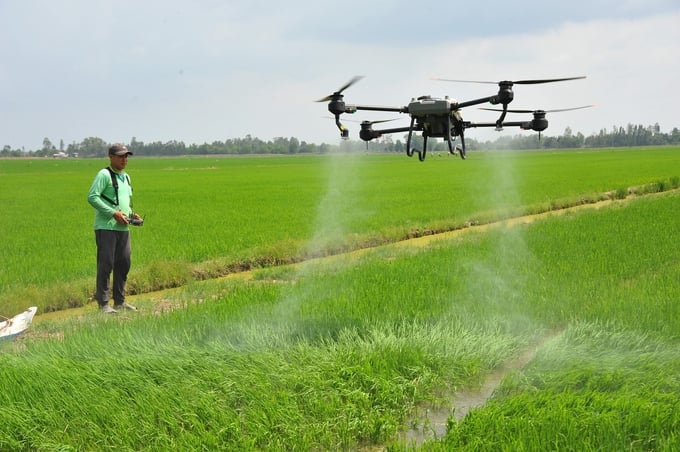
The application of scientific and technical advancements in production is crucial to the sustainable development of Dong Thap's rice industry by 2025. Photo: Le Hoang Vu.
According to Huynh Minh Tuan, Vice Chairman of Dong Thap Provincial People's Committee, the application of scientific and technical advancements in production is crucial to the sustainable development of Dong Thap's rice industry by 2025. This approach aims to reduce costs, increase productivity, and enhance farmers' profits.
Dong Thap province is currently focusing on improving production efficiency by reducing costs for fertilizers, pesticides, and seeds; improving rice quality; and expanding the production area for certified, high-quality and specialty fragrant rice varieties. The province aims to boost rice farmers' profits by 35 to 40%, and reduce the use of chemical fertilizers and pesticides by at least 30%. On the other hand, Dong Thap will accelerate the mechanization rate in production. The transition from manual sowing to rice transplanting machine utilization is expected to mechanize 15% of the sowing and transplanting areas.
Furthermore, it aims to improve local rice quality, expand the production area of certified and high-quality rice varieties, and increase the production of specialty fragrant rice. The goal is to boost farmers' profits by 35 to 40%; reduce the use of chemical fertilizers and pesticides by at least 30%; and accelerate mechanization rate in production. The transition from manual sowing to rice transplanting machine utilization is expected to mechanize 15% of the sowing and transplanting areas.
At least 20% of the province's rice production area must utilize unmanned aerial vehicles (drones) for pesticide spraying. Accordingly, efforts are directed towards achieving over 5,000 hectares of linked seed rice production annually, with organic rice production reaching 600 hectares by 2025. It is projected that by 2025, more than 42,000 hectares of rice production area will receive production unit codes to meet export requirements.
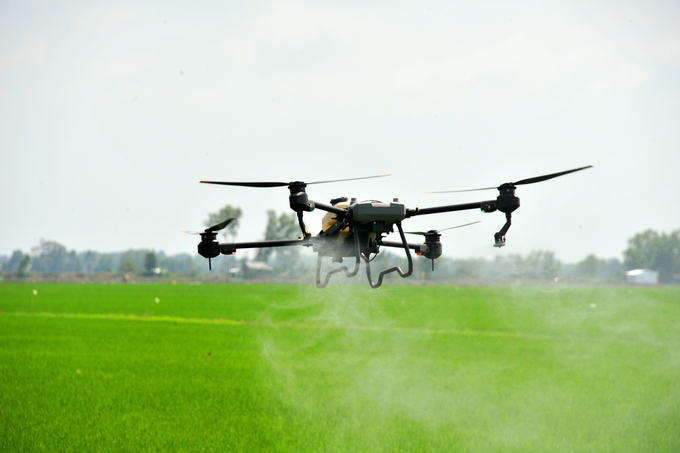
At least 20% of the province's rice production area must utilize unmanned aerial vehicles (drones) for pesticide spraying. Photo: Le Hoang Vu.
Additionally, Dong Thap aims to coordinate the application of a digital agricultural ecosystem throughout all administrative levels. This initiative involves the development of digital software and the application of smart devices to facilitate the management of digital agriculture and promote the development of the digital agricultural economy.
According to Vice Chairman Huynh Minh Tuan, the province has outlined 11 main tasks and solutions with the aim of enhancing local rice production, which include: organizing production activities; fostering innovation in production and consumption linkages; and stimulating the development of collective economy. Moreover, the province will focus on the promoting the application of science, technology and digital transformation; the implementation of origin tracing, processing, post-harvest preservation; and capacity building for human resource. These tasks have been designated as the province's priorities in rice production.
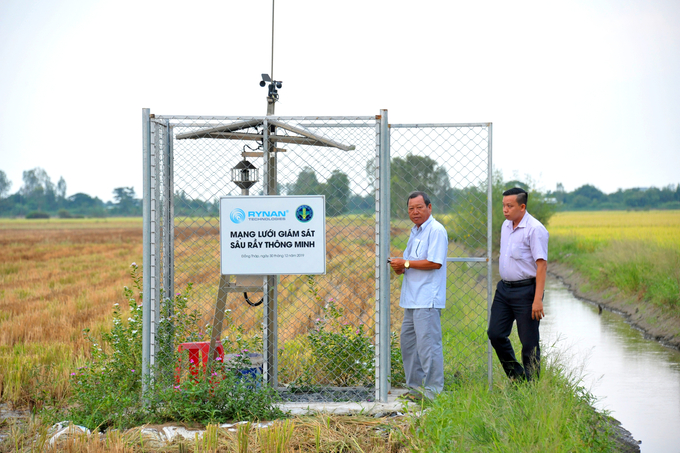
Rice farmers in Thap Muoi district, Dong Thap province, operating a smart pest monitoring network in the fields. Photo: Le Hoang Vu.
The province will conduct a comprehensive review of current agricultural policies across different administrative levels. This review aims to propose amendments, adjustments, replacements, and additions to new provincial policies, with the aim of supporting the development of the local rice industry and agricultural sector as a whole. These tasks represent key initiatives within Dong Thap province's agricultural development agenda.
"Dong Thap's development plan for the rice industry highlighted the importance of the effective development of cooperatives, and the establishment of cooperatives based on the foundation of associations, which plays into one of Dong Thap's strengths. We must elevate associations into exemplary cooperatives that represent farmer households, enhance the capacity of startup companies and family businesses in association with businesses acting as outlets for cooperatives. This progression involves gradually expanding activities including classification, processing, preservation, and direct sales.
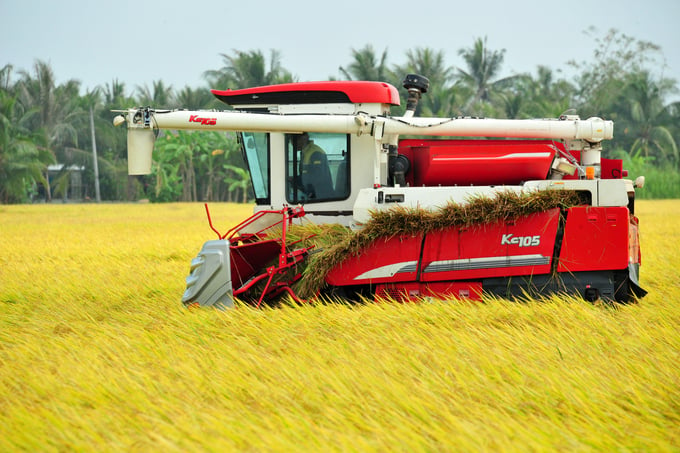
By 2025, Dong Thap province is projected to house over 42,000 hectares of rice production areas with production unit codes to meet export demands. Photo: Le Hoang Vu.
The establishment of cooperative-based economy models on the foundation of associations incorporates pioneering policies to foster innovation. Moreover, efforts will be made to facilitate the replacement of intermediaries in the supply of input materials and agricultural products, thereby building trust with customers. The development of community engagement models in association with cooperatives and businesses along the rice value chain must be emphasized," noted Vice Chairman Tuan.
Dong Thap is currently implementing digital technology to digitize agricultural production data and rural development reporting systems. Accordingly, data collected during the production process will be used for forecasting, warnings, and origin tracing at the My Dong Cooperative 2 in Thap Muoi district.
The satellite system, in combination with ground-based IoT, aids in monitoring and alerting fluctuations in flood levels, thereby facilitating appropriate production planning. The system also manages, utilizes, and creates specialized agricultural map data for different production areas; extract data for reporting and monitoring pest and natural enemy developments. Moreover, this equipment monitors greenhouse gas emissions and manages a large database on geographic indicators for the agricultural sector in Dong Thap province.
Translated by Nguyen Hai Long

(VAN) Vietnam’s TH Group officially put its high-tech fresh milk processing plant into operation in the Russian Federation, marking a historic moment as the first TH true MILK cartons were produced in Russia.

(VAN) Use of high-quality broodstock and biotechnology is regarded as the most effective approach to ensuring sustainable and economically viable shrimp aquaculture ahead of climate change and the emergence of increasingly intricate disease patterns.

(VAN) Carbon farming is a form of agricultural practices that helps absorb more greenhouse gases than it emits, through smart management of soil, crops, and livestock.

(VAN) This is a key content of the Memorandum of Understanding recently signed between the Vietnam Fisheries Society and Kunihiro Inc of Japan.

(VAN) To achieve the goal, local authorities and businesses in Kon Tum province have fully prepared the necessary conditions for the new Ngoc Linh ginseng planting season.
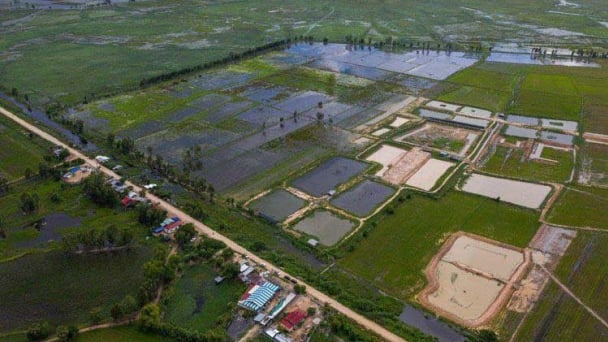
(VAN) Jiangsu province is gearing up to host training programs in Phnom Penh, the capital of Cambodia, this year to establish the Fish and Rice Corridor.
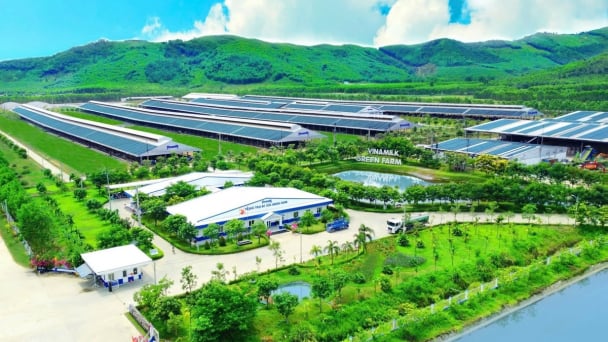
(VAN) Le Hoang Minh, representing Vinamilk, shared the company's experience in energy saving and green energy transition for production at a workshop held during the P4G Summit.